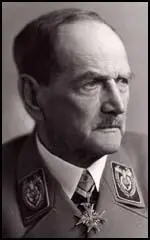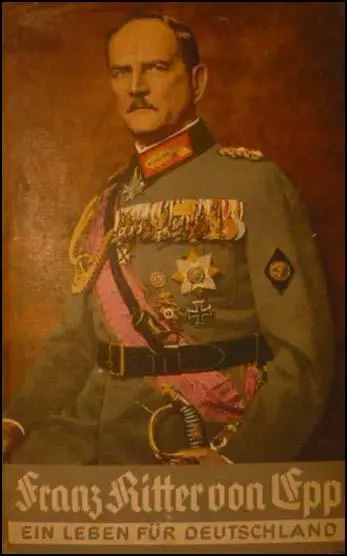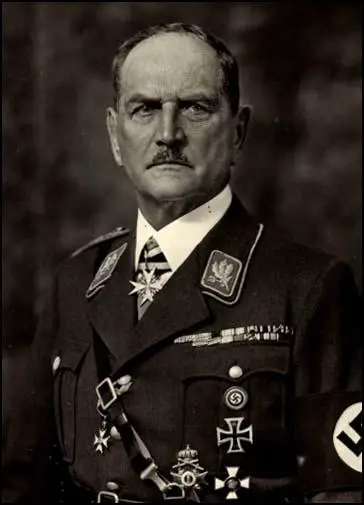Franz Epp

Franz Epp was born in Munich, Germany, on 16th October, 1868. He joined the German Army and served in China and South-West Africa before commanding the king's bodyguard regiment during the First World War where he won the Iron Cross.
After the war left-wing socialists took control of Bavaria, where Kurt Eisner, the leader of the Independent Socialist Party (ISP), formed a coalition government with the Social Democratic Party. During this period the living conditions of the Munich workers and soldiers were rapidly deteriorating. It was not a surprise when at the election on 12th January, 1919, in Bavaria, the ISP received only 2.5 per cent of the total vote. Eisner remained in power by granting concessions to the SDP. This included agreeing to the establishment of a regular security force to maintain order. As Chris Harman pointed out: "In office without any power base of his own, he was forced to behave in an increasingly arbitrary and apparently irrational manner".
On 21st February, 1919, Kurt Eisner decided to resign. On his way to parliament he was assassinated by Anton Graf von Arco auf Valley. It is claimed that before he killed the leader of the ISP he said: "Eisner is a Bolshevist, a Jew; he isn't German, he doesn't feel German, he subverts all patriotic thoughts and feelings. He is a traitor to this land." Johannes Hoffmann, of the SDP, replaced Eisner as President of Bavaria.
Eugen Levine received instructions to go to Munich to take control of the situation. The leadership of the KPD was determined to avoid any repetition of the events in Berlin in January, when its leaders, Karl Liebknecht, Rosa Luxemburg and Leo Jogiches, were murdered by the authorities. Levine was instructed that "any occasion for military action by government troops must be strictly avoided". Levine immediately set about reorganising the party to separate it off clearly from the anarcho-communists led by Erich Mühsam and Gustav Landauer. He reported back to Berlin that he had about 3,000 members of the KPD under his control.
Francis Ludwig Carsten, the author of Revolution in Central Europe: 1918-1919 (1972), has argued: "From 14 to 22 April there was a general strike, with the workers in the factories ready for any alarm. The Communists sent their feeble forces to the most important points... The administration of the city was carried on by the factory councils. The banks were blocked, each withdrawal being carefully controlled. Socialisation was not only decreed, but carried through from below in the enterprises."

Friedrich Ebert, the president of Germany, eventually arranged for 30,000 Freikorps, under the command of General Burghard von Oven, to take Munich. At Starnberg, some 30 km south-west of the city, they murdered 20 unarmed medical orderlies. The Bavarian Soviet Republic issued the following statement: "The White Guards have not yet conquered and are already heaping atrocity upon atrocity. They torture and execute prisoners. They kill the wounded. Don't make the hangmen's task easy. Sell your lives dearly."
Eugen Levine pointed out that Colonel Franz Epp posed a serious threat to the revolution: "Colonel Epp is already recruiting volunteers. Students and other bourgeois youths are flocking to him from all sides. Nuremberg declared war on Munich. The gentlemen in Weimar recognise only Hoffmann's government. Noske is already whetting his butcher's knife, eager to rescue his threatened party friends and the threatened capitalists."
The Freikorps entered Munich on 1st May, 1919. Over the next two days the Freikorps easily defeated the Red Guards. Gustav Landauer was one of the leaders who was captured during the first day of fighting. Rudolf Rocker explained what happened next: "Close friends had urged him to escape a few days earlier. Then it would have still been a fairly easy thing to do. But Landauer decided to stay. Together with other prisoners he was loaded on a truck and taken to the jail in Starnberg. From there he and some others were driven to Stadelheim a day later. On the way he was horribly mistreated by dehumanized military pawns on the orders of their superiors. One of them, Freiherr von Gagern, hit Landauer over the head with a whip handle. This was the signal to kill the defenseless victim.... He was literally kicked to death. When he still showed signs of life, one of the callous torturers shot a bullet in his head. This was the gruesome end of Gustav Landauer - one of Germany's greatest spirits and finest men."
Allan Mitchell, the author of Revolution in Bavaria (1965), pointed out: "Resistance was quickly and ruthlessly broken. Men found carrying guns were shot without trial and often without question. The irresponsible brutality of the Freikorps continued sporadically over the next few days as political prisoners were taken, beaten and sometimes executed." An estimated 700 men and women were captured and executed." It is estimated that Epp's men killed over 600 communists and socialists over the next few weeks.
In August 1919, the Völkischer Beobachter (Racial Observer) was obtained by the Thule Society. It was an anti-socialist and anti-Jewish newspaper. For example, its headline on 10th March, 1920, was "Clean Out the Jews Once and for All." The article urged a "final solution" of the Jewish problem by "sweeping out the Jewish vermin with an iron broom." The newspaper also campaigned for the construction camps to house Germany's Jewish population. The newspaper was not very popular with the German people and by the end of 1920 it was heavily in debt. Major Ernst Roehm was informed of the situation and he persuaded his commanding officer, Major General Epp to purchase it for 60,000 marks. The money came from wealthy friends and secret army funds. This now became the newspaper of the German Worker's Party (GWP) and Dietrich Eckart became its editor. Adolf Hitler took control of the newspaper in 1921 when he became the leader of the National Socialist German Workers Party (NSDAP).

It has been argued by Lothar Machtan, the author of The Hidden Hitler (2001) that Roehm and Epp were having a homosexual relationship. " There are many indications that the relationship between Rohin and Epp was homoerotic, and Hitler once let slip in later years that Rbhm's homosexuality first became known around 1920. At the end of 1920 their relationship was still so close that the then Reichswehr commander gave the then party leader contributions for party use from his secret fund 'a purely personal matter,' as he termed it later. Thus the Rohm-Epp axis was of immense benefit to Hitler, not only personally but politically. The two soldiers had resources at their disposal that greatly augmented the influence of Hitler the 'politician,' whose assets had hitherto been limited to his charisma as an orator and actor."
When the Sturmabteilung (SA) was reorganized in 1926, Von Epp became its area commander in Munich. According to Louis L. Snyder: "He hoped to have the SA supplant the regular Army when Hitler came to power. He was in charge of a special defense political office called the Wehrpolitisches Amt, the five divisions of which were concerned with external and defense policy, defense forces, and the like. But neither he nor Hitler was ever able to make the SA anything better than a motley band of street brawlers."
Epp joined the Nazi Party in 1928 and assumed control of the Sturm Abteilung (SA) in Bavaria. Later that year he was elected to the Reichstag. After Hitler gained power in 1933 Von Epp became State Governor of Bavaria, a post he held until being arrested by allied forces at the end of the Second World War.
Franz Epp died in an American internment camp on 31st January, 1947.
Primary Sources
(1) Eugen Levine, letter to Rose Levine (May, 1919)
Colonel Epp is already recruiting volunteers. Students and other bourgeois youths are flocking to him from all sides. Nuremberg declared war on Munich. The gentlemen in Weimar recognise only Hoffmann's government. Noske is already whetting his butcher's knife, eager to rescue his threatened party friends and the threatened capitalists.
But now will they at last appeal to the proletariat? Will they assemble the workers now, arm them, declare a general strike to keep them on the alert? Nothing of the kind. Plans are being fabricated, decrees drafted about the creation of a Red Army... . But the decree still remains in draft form. Thev are in no great hurry.
(2) Lothar Machtan, The Hidden Hitler (2001)
Ernst Rohm, a career staff officer during World War I, had become adjutant to Ritter von Epp, the Freikorps commander, when the German Empire collapsed. In company with Epp's troops he helped to bring down Munich's revolutionary "Councils Republic" in April-May 1919, and he remained bitterly opposed to the youthful Weimar democracy. Epp had been entrusted with command of the infantry stationed in Bavaria, so Rohm himself acquired a military key position. In 1921, however, their extremely cordial relationship turned sour because Rohm was made subordinate to Otto von Lossow, commander of the Reichswehr in Bavaria. "General von Epp found my collaboration with the new authorities awkward," Rohm wrote later. "Probably under the impression that I meant to detach myself from his influence by degrees, he turned cooler toward me." Thus their "loyal cooperation in the most difficult situations" culminated in "an estrangement from which I cannot, admittedly, exonerate myself."'
There are many indications that the relationship between Rohin and Epp was homoerotic, and Hitler once let slip in later years that Rbhm's homosexuality first became known around 1920. At the end of 1920 their relationship was still so close that the then Reichswehr commander gave the then party leader contributions for party use from his secret fund "a purely personal matter," as he termed it later. Thus the Rohm-Epp axis was of immense benefit to Hitler, not only personally but politically. The two soldiers had resources at their disposal that greatly augmented the influence of Hitler the "politician," whose assets had hitherto been limited to his charisma as an orator and actor.
(3) William L. Shirer, The Rise and Fall of the Third Reich (1964)
One by one, Germany's most powerful institutions now began to surrender to Hitler and to pass quietly, unprotestingly out of existence.
The states, which had stubbornly maintained their separate powers throughout German history, were the first to fall. On the evening of March 9, two weeks before the passage of the Enabling Act, General von Epp, on orders from Hitler and Frick and with the help of a few storm troopers, turned out the government of Bavaria and set up a Nazi regime. Within a week Reich Commissars were appointed to take over in the other states, with the exception of Prussia, where Goering was already firmly in the saddle. On March 31, Hitler and Frick, using the Enabling Act for the first time, promulgated a law dissolving the diets of all states except Prussia and ordering them reconstituted on the basis of the votes cast in the last Reichstag election. Communist seats were not to be filled. But this solution lasted only a week. The Chancellor, working at feverish haste, issued a new law on April 7, appointing Reich Governors (Reichsstaathaelter) in all the states and empowering them to appoint and remove local governments, dissolve the diets, and appoint and dismiss state officials and judges. Each of the new governors was a Nazi and they were "required" to carry out "the general policy laid down by the Reich Chancellor".
Thus, within a fortnight of receiving full powers from the Reichstag, Hitler had achieved what Bismarck, Wilhelm II and the Weimar Republic had never dared to attempt: he had abolished the separate powers of the historic states and made them subject to the central authority of the Reich, which was in his hands. He had, for the first time in German history, really unified the Reich by destroying its age-old federal character.
